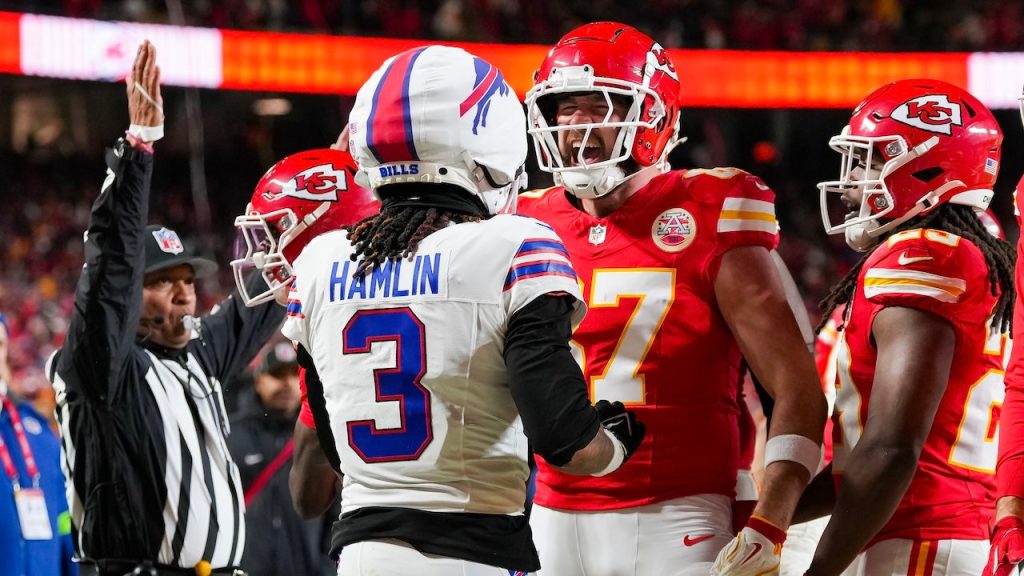The Kansas City Chiefs’ thrilling AFC Championship victory over the Buffalo Bills, securing their spot in Super Bowl LIX, was not without controversy. Tight end Travis Kelce found himself at the center of a post-game disciplinary action, receiving an $11,255 fine for taunting. The incident occurred following a Patrick Mahomes touchdown run in the waning minutes of the second quarter. Kelce confronted Bills safeties Damar Hamlin and Cole Bishop, engaging in aggressive head nodding and verbal exchange. Despite the presence of multiple referees in close proximity, no unsportsmanlike conduct penalty was called on the field, which would have resulted in a 15-yard penalty against the Chiefs. However, the referees did flag Bills defensive tackle Jordan Phillips for unnecessary roughness after he retaliated to Kelce’s taunting with a headbutt, resulting in a 15-yard penalty for the Bills and a subsequent $6,722 fine for Phillips.
The officiating throughout the AFC Championship game drew significant criticism, particularly from Bills fans and neutral observers. Several calls appeared to favor the Chiefs, sparking outrage on social media and fueling debate about the consistency and fairness of NFL officiating. One of the most contentious calls involved a fourth-down attempt by Bills quarterback Josh Allen in the fourth quarter. Officials ruled Allen short of the first down marker, a decision disputed by CBS rules analyst Gene Steratore, who believed Allen had achieved the necessary yardage. This call became a focal point of fan frustration, further intensifying the scrutiny on the officiating crew.
Another controversial call occurred in the second quarter, involving a catch by Chiefs wide receiver Xavier Worthy. Despite replay footage suggesting the ball may have touched the ground, the officials upheld the catch, adding to the growing list of questionable calls benefiting Kansas City. These officiating controversies followed a similar pattern from the Chiefs’ divisional round victory against the Houston Texans, where two roughing the passer penalties called against the Texans drew criticism.
The divisional round game against the Houston Texans saw two questionable roughing the passer calls against Texans defenders targeting Patrick Mahomes. The first involved edge rusher Will Anderson Jr., who appeared to push Mahomes in the chest after an incomplete pass. The second came during a Mahomes scramble, where he slid to avoid contact, yet a penalty was still called. These calls prompted strong criticism from Texans players and head coach DeMeco Ryans, as well as commentators like ESPN’s Troy Aikman, who labeled the penalties as issues the league needed to address in the offseason.
The recurring nature of these calls favoring the Chiefs, particularly involving protection for Mahomes, prompted questions about potential preferential treatment. When questioned by reporters about this perception, Mahomes denied feeling any special consideration from officials. He emphasized the referees’ efforts to call the game fairly and stressed his focus on playing the game to the best of his ability. He acknowledged the variability of officiating and the unique nature of each play, attributing these factors to the inherent unpredictability of the NFL. Mahomes’ teammate, Travis Kelce, opted not to discuss the officiating controversies when prompted by his brother, Jason Kelce, on their podcast, “New Heights,” jokingly invoking his Fifth Amendment right to remain silent.
The confluence of these close calls, often going in favor of the Chiefs during their playoff run, fueled speculation and debate about the role officiating played in their success. While the NFL maintains the integrity of its officiating, the controversies surrounding these calls highlight the ongoing tension between the subjective nature of some rules and the demand for consistent and fair application. The calls undoubtedly added another layer of complexity to the Chiefs’ journey to Super Bowl LIX, sparking discussions about the balance between protecting quarterbacks and ensuring fair play for all teams.
These officiating controversies underscore the challenges inherent in refereeing a fast-paced, complex game like professional football. The speed of play often forces referees to make split-second decisions, with limited opportunity for review in real-time. While replay technology aids in correcting some errors, the subjective interpretation of certain rules, such as roughing the passer and determining possession on close plays, remains a source of contention. The debates surrounding these calls highlight the ongoing need for clear and consistent application of the rules, as well as continued exploration of ways to improve officiating accuracy and minimize the impact of controversial calls on the outcome of games.


